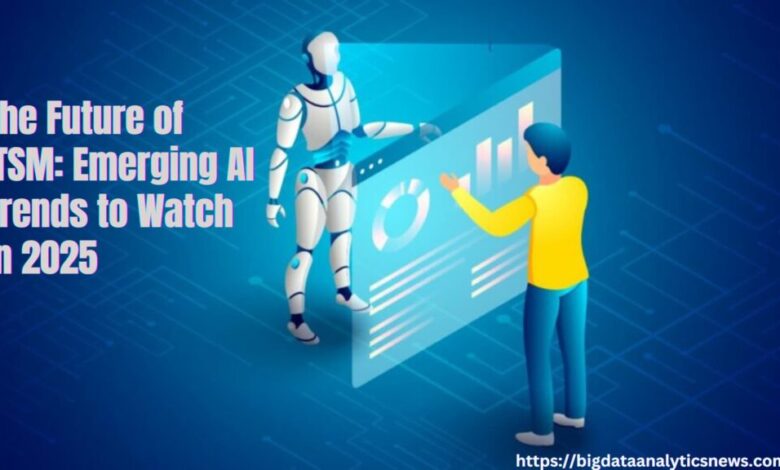The Future of ITSM: Emerging AI Trends to Watch in 2025



Organizations rely on technology for everything from communications to customer service. However, many companies suffer from underperforming IT departments that are hampered by high operational costs, inefficiencies, limited scalability, delayed response times and poor problem resolution. Traditional IT service management (ITSM) solutions typically fail to address these issues due to rigid procedures and a lack of a flexible practice framework to meet today’s business demands.
As we approach 2025, it is clear that traditional methods cannot keep up with the technology-driven environment. From cloud transformation to AI-powered enterprise service management: the transition to more flexible, adaptive service management systems is essential. AI has the potential to disrupt ITSM in ways that transform the way companies manage IT services by increasing efficiency and delivering exceptional user experiences. Let’s look at early examples of this:
AI trends shaping IT service management
AI is an emerging trend that is transforming the service management system in IT service management (ITSM) and revolutionizing the way services are delivered. Some ways AI is being applied in ITSM are:
Automation of routine tasks
Modern IT service management is able to perform routine tasks effectively. AI automates ITSM activities, increasing operational efficiency and speed. It includes enhanced level 0 support capabilities with AI-powered chatbots and virtual assistants that can handle basic questions and support requests. From automating routine actions to identifying and preventing issues, AI allows your IT team to focus on important initiatives while delivering excellent user experiences.
Predictive analytics for proactive management
AI-powered predictive analytics can detect IT infrastructure issues before they impact your end users. By evaluating patterns and trends, AI alerts your IT team to potential disruptions, enabling proactive solutions.
- For customers, the reliability of AI-powered IT systems results in smoother user experiences, increasing customer satisfaction as services are continuously accessible without unexpected downtime.
- For employees, AI-enabled proactive management empowers your IT team, allowing them to prioritize innovation over firefighting and fostering a culture of efficiency and constant development.
Intelligent decision support
AI improves ITSM decision making by providing actionable insights based on data analysis. Machine learning algorithms review past incidents and recommend effective solutions, resulting in faster resolution times and higher service quality. Furthermore, AI predicts future demand for IT resources and allocates them appropriately intelligent operations streamlining resource management. Predictive analytics provides insights for better decision making, resource allocation and budget planning. Anticipating future demands improves both your operational efficiency and the agility of your organization.
Machine learning and natural language processing (NLP)
Machine learning and natural language processing (NLP) are revolutionizing ITSM by improving the efficiency and effectiveness of service delivery. Machine learning algorithms analyze massive amounts of data to identify patterns and trends, enabling proactive management of your IT services. NLP, on the other hand, interprets and understands text-based data, such as incident reports and service requests. By leveraging these technologies, you can automate numerous ITSM processes, including incident classification and routing, improving response times and service quality. Automation not only streamlines services, but also allows your IT team to focus on more strategic initiatives.
Enterprise Service Management (ESM)
Enterprise Service Management (ESM) extends the principles and practices of ITSM beyond your IT department to other areas of your organization, such as HR, finance and facilities management. By applying ITSM methodologies to various business functions, ESM improves the efficiency and effectiveness of service delivery across your entire enterprise. This holistic approach to managing services ensures that all departments work in harmony and provide a seamless experience for both customers and employees. ESM promotes a culture of continuous improvement and innovation, drives business value and supports organizational change management.
Incident management
Traditional ITSM often uses manual incident management techniques, hindering real-time visibility into issues and their impact on your business. AI is critical to transforming this landscape by discovering the root causes of IT problems. AI discovers hidden patterns and connections in incident data using advanced analytics. Additionally, machine learning algorithms enable companies to anticipate incidents before they worsen, reducing disruptions and improving IT performance.
Service configuration management
AI improves IT asset management by automating asset and configuration discovery, keeping the Configuration Management Database (CMDB) up to date. By continuously monitoring configurations, AI can identify anomalies that indicate security threats or operational inefficiencies. The CMDB is a critical repository for comprehensive information about IT assets, configurations, and relationships between them. Using AI to maintain a reliable CMDB ensures data is available for impact analysis and effectively managing changes within your IT environment.
Although AI is driving breakthroughs in ITSM, the transition to these AI-enabled processes is not without hurdles. Critical challenges must be overcome to ensure that AI can be seamlessly integrated into ITSM processes.
Potential challenges in the transition to AI-enabled ITSM processes
When transitioning to AI-based IT service management practices, your enterprise may encounter obstacles to achieving successful integration. Some potential obstacles include data security and privacy concerns, workforce resistance to AI implementation, the need to train your IT team in working with AI technology, and ensuring the ethical use of AI in decision-making processes.
Respond to such challenges by instituting strong data protection measures, developing thorough training programs to help employees become familiar with AI technology, fostering a culture of open collaboration to help increase AI adoption, and establishing clear guidelines for the ethical use of AI tools. If you can proactively address these challenges, the migration to AI-enabled ITSM can be achieved efficiently with the maximum performance and benefits realized through AI investments.
Conclusion
The impact of AI on ITSM is nothing short of revolutionary. From automating routine actions to identifying and preventing problems, AI technologies are transforming the service value chain in IT service management. As you embrace AI-powered solutions, you position yourself to deliver more efficient, proactive, and user-centric IT services, ultimately driving business success in an increasingly digital environment. The journey continues and the full potential of AI in ITSM has yet to be fully realized, making this an exciting moment for IT professionals and the businesses they serve.




